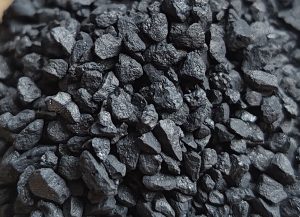Your trust Supplier
AmoPlus ® Ammonia synthesis catalyst is a new type of low temperature and low pressure high activity ammonia synthesis catalyst jointly developed. The composition, proportion, and iron ratio are different from other ammonia oxidation catalysts in China, which is original.
The ATA207 series ammonia synthesis catalyst is a Fe3O4 type cobalt-containing catalyst. It is different from an iron catalyst in ammonia production.
Our ammonia converter catalyst has the characteristics of easy reduction, low reduction temperature, low activation temperature, high activity at low temperature, strong anti-toxic and heat resistance, high mechanical strength, etc. Its performance has reached and partially exceeded that of the ICI74-1 ammonia synthesis catalyst of the UK and the ammonia decomposition catalyst of the US.

ATA207 Implementation Standard of ammonia synthesis catalyst is the Chemical industry standards of the People’s Republic of China HG/T3550-2013: Ammonia Synthesis Catalyst.
ATA207H Implementation standard of ammonia synthesis catalyst is the Chemical industry standards of the People’s Republic of China HG/T5416-2018: Pre-reduced Ammonia Synthesis Catalyst.
Compared with A110-1 iron catalyst in ammonia production, ATA207 has added cobalt, which increases the active center, and also improves the pore structure, which facilitates the transfer of reactants and products, and significantly enhances the low temperature activity.
ATA207 has significantly less alumina and calcium oxide additives added compared to A201, and has increased the exposed surface area of a-Fe and improved the low temperature reduction performance.
Compared with ferrous catalysts, ATA207 has a unique iron ratio with more trivalent iron than other similar catalysts, which best maintains the anti-spinel structure of Fe3O4 and facilitates the entry of Fe+3 ions into the Al2O3 spinel structure to form a solid melt and maintain a better heat resistance performance.
The main chemical component of ATA207 is Fe3O4 and contains an appropriate amount of CO, K2O, Al2O3, Cao and other additives, in which the mass fraction of cobalt oxide (Co3O4) is ≥ 1.0%.
ATA207H pre reduced ammonia synthesis catalyst adopts ATA207 ammonia synthesis catalyst to reduce the finished product in low-pressure and high hydrogen unit. The reduction degree of ATA207H pre-reduced ammonia synthesis catalyst is more than 95%. The surface passivation process at atmospheric pressure and 50 ℃ low temperature is adopted.
The main components are: α- Fe catalyst to form a FeO film on the surface. This layer of FeO film well protects the reduced catalyst from oxidation and is convenient for transportation, storage and loading. The passivation degree is 8 ~ 12%, and the oxygen content is generally less than 2%. It is very easy to reduce during reduction in use.
Greatly improved activity due to the increase of K2O content
K2O is about 20 ~ 30% higher than other types of catalysts, which promotes ammonia adsorption and nitrogen adsorption, and greatly improves the activity of DNCA ammonia synthesis catalyst and other types of catalysts.
Add Cobalt Oxide to Improve Activity of the Catalyst at Low Temperature
In the melting process, cobalt oxide and magnetite form a solid melt. After reduction, cobalt atoms are evenly distributed in the α-Fe lattice, which increases the number of active centers, the pore structure is improved, and the specific surface area is increased, which is conducive to the transfer of reactants and products, so that it has good low-temperature activity.
Properly adjust the content of Al2O3 and CaO additives
Al2O3 and CaO are structural additives. During the development of DNCA catalyst, the comprehensive effect of structural additives was fully considered, and the contents of Al2O3 and CaO additives were reasonably adjusted to increase the contact area between α- Fe and hydrogen and nitrogen, it improves the reduction performance and activity of the catalyst.
Original Fe2 + / Fe3 + Ratio
The value of iron ratio of the catalyst is closest to the iron ratio of fine magnetite, which is conducive to the metal ions of Al2O3 entering the spinel structure, making them evenly distributed in the magnetite phase, and giving full play to the role of Al2O3 as a structural assistant.
Main physical Properties
Item | ATA207 | ATA207H |
Appearance | Irregular solid particles with black metallic luster and magnetism | Irregular solid particles with silver gray metallic luster and magnetism |
Specification Granularity | 1.5~3.0 mm | |
Equivalent Diameter | 1.38 mm | |
Bulk Density | 2.8~3.0 Kg/l | 2.2~2.4 Kg/l |
Specific Surface Area | ~16.2 m3/g | ~16.2 m3/g |
Porosity | ~45 % | ~45 % |
Water output | ~290 Kg/t | 20~30 Kg/t |
Morphological coefficient | 0.50~0.60 φs | |
Dust content | 0.5 % max | |
Activity Index
ATA207 ammonia synthesis catalyst shall be tested according to GB / t3545 ammonia synthesis catalyst test method
Under laboratory conditions, when the particle size of catalyst is 1.0 ~ 1.4mm, the loading is 2ml, the pressure is 15.0mpa and the space velocity is 3 × 104hr-1. When the temperature is 415 ℃ (after heat resistance at 500 ℃ for 20h), the outlet ammonia shall not be less than 14.0%.
Strength
According to the American ASTM standard method, the wear particle size is 1.0 ~ 3.0mm, and the wear rate is less than 2.0%.
Other Materials of Catalyst
MagicMax® ZSM-5 Zeolite is a high Mole Ratio of SiO2/Al2O3 additive. Super XFocus® (a low-rare-earth SOx reduction additive) provide refiners with the most cost-effective solutions to reduce SOx emissions from their FCC units.Our current portfolio of FCC additives allows refiners to reduce SOx, NOx, and CO emissions from their FCC units, as well as lower sulfur content in gasoline. It is not a natural zeolite mineral.
Best Offer 20% Discount
Delivery Time: 7 Days
Custom oem packing
24/7 Support
Zone A,No.666 Yangguang Road,Xinyang Industrial Dist,Haicang,Xiamen,China 361014
Copyright © 2022 Antenchem,
All Rights Reserved.